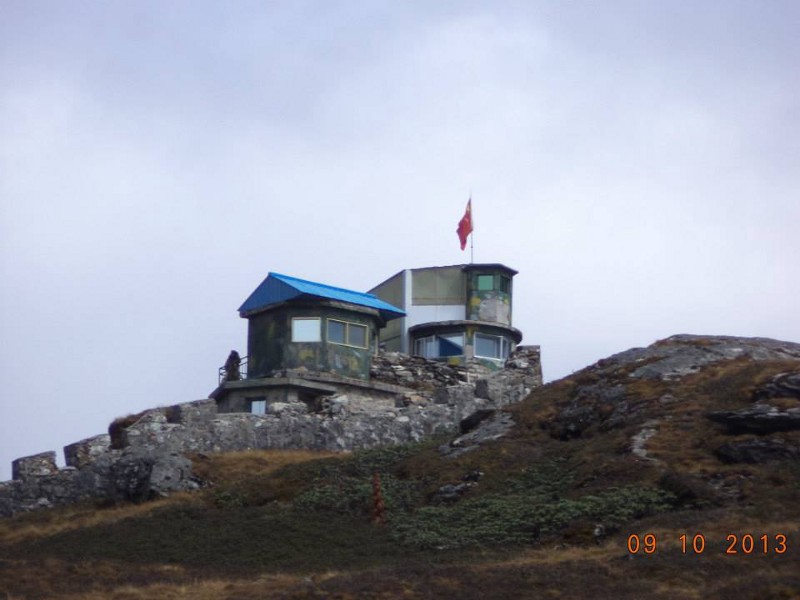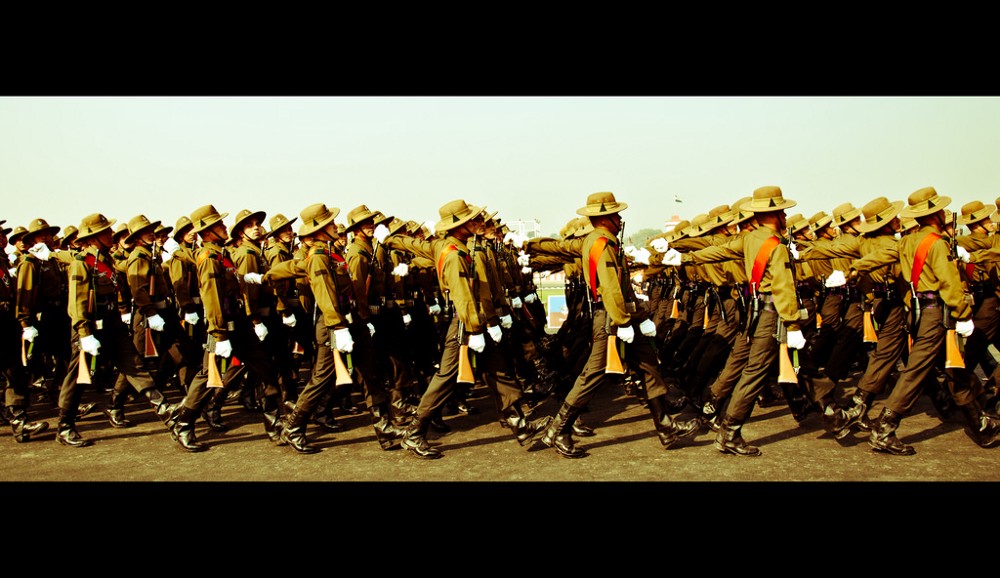Nepalese are still wary of the territorial loss due to the 1962 war between China and India caused them. They do not want the Doklam stand-off to spin out of control
“If two elephants fight, the grass underneath them will get crushed. If the same elephants make love, even in their bonhomie, the grass will get crushed,” says Hari Sharma, an eminent political scientist and author, while sitting in a cafe on Kathmandu’s Durbar Marg. Politicians and foreign policy analysts alike have repeatedly used the same analogy to outline the costs of an India-China war for Nepal. If the tensions persist or aggravate between its two neighbours, there is a chance that the fallout will spill over from Bhutan to Nepal. The Kathmandu-elite is watching the events unfolding in Bhutan with eyes peeled.
Nepal has been on fire before because of war between India and China. “Smaller countries might be affected the worst, they might be swallowed in such a war,” explains Madhesi activist CK Lal to Hardnews and adds, “There has been the issue of Lipulekh where Nepal’s sovereignty was compromised.” In 1962, when the war between India and China came to an end, Lipulekh pass, which connects India and China through Nepal, became contested territory. India positioned its troops to guard the pass and played deaf to the Himalayan country’s protests to the extent that Nepali diplomats went to India Office Records at The British Library in London to find evidence of territorial ownership. There has been a growing chorus in the Nepali press over the Lipulekh issue, cautioning the public of the dire consequences of war. Nepal was once again left out of the conversation in 2015 when India and China, in a time of better relations, decided to increase trade through the Lipulekh pass.
“The fight between China and India would be disastrous for both the countries. There is too much at stake for China, they need the Indian market and won’t risk a war. Tensions between the two countries can help Nepal beat India with a stick,”
An aide to former Nepali Prime Minister Baburam Bhattarai explained to Hardnews that there were two types of people watching the face-off and the subsequent skirmishes in Doklam: “The first are those who are seeing it with curiosity and the second type, which includes Nepali people, are watching it with trepidation.” The former he associates with the west and the latter with the neighbourhood.

Dipak Gyawali, former water resource minister of Nepal, says that China has, in recent years, been wary of the West, and now India seems to be toeing the line of the western countries. He says China does not want to fight India and even earlier China had tried to wrench India away from the US’ influence. “In 2008–09, around the time the nuclear deal was struck between India and the US, the then Chinese Premier Wen Jiabao stopped over in Nepal for twenty-two hours, attempting to persuade India from signing the Nuclear Deal,” remarks Gyawali.
“The fight between China and India would be disastrous for both the countries. There is too much at stake for China, they need the Indian market and won’t risk a war. Tensions between the two countries can help Nepal beat India with a stick,” says another political analyst in Kathmandu. According to him, Chinese efforts to build roads and rails in Nepal are on because the country provides the easiest, shortest route to India. “If they wanted to do something for Nepal, why aren’t they helping build rail connectivity east-to-west? Or in the Terai? They are willing to move mountains to cater to the Indian demands.” This is a sentiment that is echoed through many parts of the city, there are others who don’t want India and China to fight for very different reasons.
“It would be interesting to see how India would counter the Chinese aggression,” he continued. India’s entry into war, however, also holds out another possibility — if India fights, so does Nepal by proxy.
“If there is a war, the costs for Nepal will be too high,” says Laxman Ghimire, water minister of Nepal between 1991–93. According to the former minister, If both India and China are consumed by war, the need for security might impose another blockade. This potential blockade may have a debilitating consequence for the Nepali society. The 2015 blockade has managed to get its way into the psyche of not only the political class but the average Nepalis who now see India, not as a long trusted ally but a boorish, temperamental, interfering neighbour who no longer plays the tune of the country’s establishment.
Using Doklam
While Nepal’s Foreign Minister Krishna Bahadur Mahara said on Monday that Nepal will maintain a neutral stand and not take sides between India and China. There are people who are using the Doklam stand-off as a bargaining chip with India. According to CK Lal, especially after 2015, nationalism according to the Kathmandu elite is ‘Anti-India’.

via JK Gorkha Reginment Flickr, Commons
It is needless to say that the five-month long Indian blockade of 2015 not only antagonised the people of Nepal, but pushed them further away and closer to their neighbour in the north, who wasted no time in sending a train from Gyirong port with essential supplies. While the gesture on China’s part was more ‘symbolic’, it helped prop up a new form of nationalism which is now synonymous with anti-India. “We didn’t bow down to India for those five months, neither did we succumb to China,” stresses a Nepali taxi driver, as he sped through Kupondole to Lazimpat in the capital. The new nationalism put forward in Nepal is enticing, and has many takers. This growing chorus is affecting the way both politicians and civil society commentators are looking at Doklam.
“Nepal is just trying to not get caught in the cross current between the two countries.” The neutrality that Nepal seeks can be seen as a matter of self-interest. “It is time for Nepal to look out for itself, and try to take the best from both the countries,”
“Very few countries will support India openly,” says Kapil Shrestha, a member of Nepal’s election observation committee, a human rights expert and political science professor at Tribhuvan University. “It would be interesting to see how India would counter the Chinese aggression,” he continued. India’s entry into war, however, also holds out another possibility — if India fights, so does Nepal by proxy.
“The people here are wary of India because we see what is happening in Gorkhaland. Gorkhas contribute a large number of soldiers to the Indian Army,” remarks Shrestha. There are 39 battalions fighting for the Indian Army under seven Gorkha regiments. This has also upped the stake of the involvement of the Nepalese in this conflict. However, what is irking the Nepalese more is the way the Gorkhaland agitation is unfolding in Darjeeling, which is further fueling anger towards India.
Rajan Bhattarai, Member of Parliament with the Communist Party of Nepal (Unified Marxist-Leninist), in a conversation with Hardnews said that his party hopes that the two countries resolve the issue: “We don’t like seeing the region thrown into conflict, and we support peace in the region. Both countries must come together.”
Former ambassador to India, Bekh Bahadur Thapa, told Hardnews, “Nepal is just trying to not get caught in the cross current between the two countries.” The neutrality that Nepal seeks can be seen as a matter of self-interest. “It is time for Nepal to look out for itself, and try to take the best from both the countries,” says a local shopkeeper. However plausible and possible that scenario might be, the call for peace is absolutely necessary for Nepal because much like Bhutan it has too much at stake.
Chinese presence has increased substantially in the Himalayan nation because of a variety of reasons: a growth in Foreign Direct Investment, Beijing’s participation in infrastructure building and lastly, the inclusion into Belt and Road Initiative. China’s growing presence in Nepal has irked India. But at this point, the biggest resistance to Chinese expansion are the people of Nepal. There is much paranoia spreading through Nepal regarding the Kalapani threat because they don’t want to be the next Bhutan and have their sovereignty compromised.